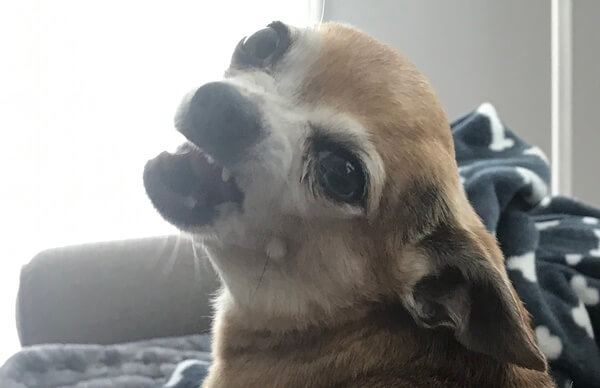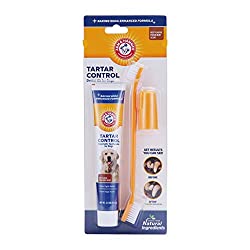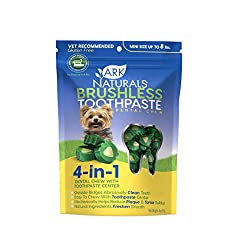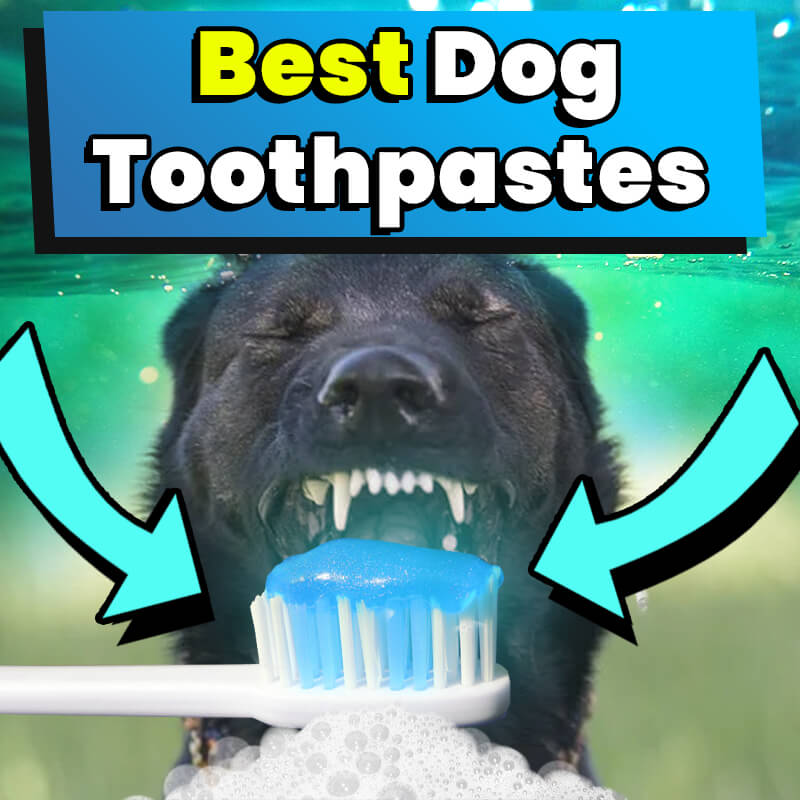
Did you know that dental disease affects 80% of all dogs by the time they reach two years of age? To make matters worse, Chihuahuas are more likely to develop teeth and dental problems than other dog breeds. Chihuahuas with oral disease have been linked to several health issues such as tooth loss, kidney damage, liver and heart problems, and joint pain.
While Chihuahuas can live relatively long lives, health issues like dental disease can, unfortunately, shorten their lifespan by one to three years.
Table of Contents
How many teeth do Chihuahuas have?

An adult Chihuahua will have a total of 42 teeth. These 42 teeth include molars, premolars, canines, and incisors. Here is a quick breakdown of the 42 adult teeth:
- Molars (back teeth used to chew hard food): 10 teeth.
- Premolars (teeth with sharp edges to shred food): 16 teeth.
- Canines (sharp, pointy, long teeth): 4 teeth.
- Incisors (small teeth at the front for scraping food): 12 teeth.
Unfortunately, due to tooth decay or through rough play, there is a chance of losing some of these teeth.
When Chihuahuas are puppies, they have a total of 28 milk teeth. These milk teeth are similar to human baby teeth since they will fall out when Chihuahua puppies reach 8 months of age. They are then replaced by 42 permanent adult teeth. For more information on the teething stage of Chihuahua, scroll to the bottom of the article.
Chihuahua teeth problems
Smaller dog breeds like the Chihuahuas are more susceptible to dental issues like oral or periodontal disease. There are many reasons why Chihuahuas are prone to dental issues.
Higher ratio of teeth to jaw in Chihuahuas
Since Chihuahuas have smaller heads and jaws, it can cause overcrowding of teeth in the mouth. A Chihuahua should have 42 teeth total and to fit all these teeth in their mouth can lead to overcrowding and difficulty in cleaning.
Since the teeth are crowded together, there’s very little space between their teeth. Additionally, the bacteria can accumulate in areas that are harder to reach and clean leading to the bacteria accumulating even more and cause plaque and tartar. This can then lead to tooth loss and gum disease.
Food and diet affect the Chihuahua’s teeth
When it comes to your Chihuahua’s food and diet, it’s best to stay away from sugary snacks and food. We highly advise keeping to high-quality food with protein when it comes to feeding your Chihuahua.
Chihuahua owners can also make homemade dog food for their pups. This way, you know that the ingredients in the food are safe for your pooch and if there’s any sugar or salt in the food. The food you make at home for your Chihuahuas is also easier for them to bite down on and chew and puts less stress on their small teeth.
Keep in mind that dry dog food can be harsh on your Chihuahua’s teeth. Many argue that the dry kibble is great for your Chihuahua’s teeth because it can easily scrape off the plaque and tartar from your dog’s small teeth.
However, we believe that dry kibble can scratch the enamel of your Chihuahua’s sensitive small teeth and instead of feeding our dogs dry kibble to help with their plaque and tartar, it’s best that we brush and clean our dog’s teeth regularly for healthy oral hygiene.
Periodontal disease in dogs and Chihuahuas
According to the American Veterinary Dental College (AVDC), periodontal disease in dogs, specifically Chihuahuas, is when the gum tissue, bone, and structure that holds the dog’s teeth in place gets destroyed by a bacterial infection.
The bacterial infection can be caused by eating too many sugary snacks and food. When our Chihuahua eats sugary snacks, the sugar gets stuck on and between their teeth. Additionally, the dog’s saliva doesn’t provide the acid to break down the sugar. Instead, the bacteria in your Chihuahua’s mouth actually use the sugar to produce acids.
This is terrible for your Chihuahua’s teeth because the acid that’s produced is very acidic and can damage the outer coating or the enamel of your dog’s teeth. The mineral in the enamel that is protecting your Chihuahua’s teeth is destroyed by the acid.
Prevention is the key to healthy teeth in Chihuahua

If your Chihuahua’s teeth aren’t brushed regularly or aren’t checked by the vet at least once a year with professional cleaning, there can be a significant amount of plaque and tartar buildup not only on the teeth but also on and under the gum line. This destroys the tissue that supports your Chihuahua’s precious teeth.
Over time, this can lead to tooth decay and tooth loss and can be very painful. This can affect your dog’s diet and overall health.
We highly recommend that you bring your Chihuahua to the veterinary dentists for professional teeth cleaning at least 2 times a year for healthy strong teeth and to prevent tooth loss. In the meantime, you can also help your Chihuahua maintain good oral hygiene and teeth at home by brushing them regularly using dog-friendly toothpaste and coconut oil.
We recommend that Chihuahua owners brush their dog’s teeth at least three times a week.
Check out: Best Dog Toothpastes for your Chihuahua. We’ve provided several top-rated dog toothpaste options depending on your Chihuahua’s dental needs.
The best time to start an oral hygiene routine is when your Chihuahuas are puppies. When your Chihuahuas are puppies, everything is new to them. They don’t have any expectations or have any bad associations. By implementing good oral hygiene early in their life, your Chihuahuas will get accustomed to getting their teeth brushed regularly.
When they reach adulthood, your Chihuahuas are used to routine brushing and cleaning and it will be easier to maintain good oral hygiene throughout their lives.
Signs of dental disease in dogs and Chihuahua
As you can see, Chihuahuas are prone to periodontal disease. Since the Chihuahua dog breed has small, soft, and sensitive teeth, it puts them more at risk of bacterial infection which leads to tooth decay and eventually tooth loss.
For this reason, it’s vital that Chihuahua owners help their Chihuahua maintain good oral hygiene and that starts with regular brushing and routine visits to the veterinary dentist. If you notice the following signs and symptoms of dental disease in dogs, be sure to contact your veterinary dentist right away:
- Loss of appetite because it can be painful to chew and eat.
- Weight loss due to loss of appetite.
- Bleeding from the gum or mouth.
- Dropping food when your Chihuahua is eating.
- Drooling frequently.
- Behavioral changes such as not wanting you to touch their mouth area due to tooth or gum sensitivity.
- Discolored teeth: yellow and covered in plaque and tartar.
- Loose teeth.
- Bad breath.
When your Chihuahuas have tooth pain or have tooth sensitivity, they may cry or whimper as a way to relieve some of that pain. A crying Chihuahua could also indicate that the problem is severe and it’s time to visit the veterinary dentist.
Chihuahua Teeth: Treatment for dental disease in dogs
If you suspect any of these signs and symptoms, it’s best to schedule a dental appointment as soon as you can.
Thorough oral examination of the Chihuahua’s teeth and gum
Treatment for dental disease in dogs starts with an oral examination. The veterinary dentist will examine the Chihuahua’s teeth and mouth thoroughly and this could include using an x-ray to evaluate the damage to the teeth and gum.
Professional cleaning of the teeth and gum in Chihuahuas
Then, there is professional teeth and gum cleaning. The vet will polish the teeth and scale in some cases.
Removing damaged teeth from your Chihuahua
If there are severely rotting or damaged teeth in your Chihuahua’s mouth, your vet may decide to remove them. Before making this decision, the vet will determine whether it is possible to save your Chihuahua’s teeth.
At-home dental care for your Chihuahua
In the meantime, we recommend that Chihuahua owners implement teeth brushing routine if there’s currently no routine yet.
Don’t wait until it is too late and your Chihuahua starts losing their teeth. Make it a habit just like you would when it comes to grooming or brushing your long haired Chihuahua’s coat.
So start early. Both prevention and maintenance are the keys to good dental health in our Chihuahuas.
You can get dental coverage through your pet insurance. Be sure to sign up for pet insurance if you haven’t yet. It will help alleviate some of that financial burden.
Chihuahua teeth removal cost
Chihuahua teeth removal cost can be pricey! The cost to remove a Chihuahua’s teeth can cost between $500 to $800. The removal cost also depends on how complex it would be to remove the tooth or teeth and your Chihuahua’s overall health. The more complex it is to remove your Chihuahua’s teeth, the more it can cost.
How to brush Chihuahua teeth: 4 easy ways
Materials needed:
- Toothpaste specifically for dogs,
- A piece of gauze or small toothbrush for your Chihuahua or,
- Oral care finger brush.
- Using a dog toothpaste, put a pea-size amount onto a gauze, small toothbrush, or finger brush.
- With one hand, lift the corner of your Chihuahua’s mouth.
- Brush with a circular motion along the line where the tooth meets the gum.
- Make sure to brush all the teeth in your Chihuahua’s mouth including the molars, premolars, canines, and incisors in the lower teeth and upper teeth.
While you are brushing your dog’s teeth, you may want to feel or look for any oral issues like receding gums, bleeding, cavities, or tooth decay.
Some busy Chihuahua owners prefer to give their small pooch dental chews like this one. This dental chew is specifically for small dog breeds like the Chihuahua:
Chihuahua Teeth stages
Like human babies, Chihuahua puppies are born without any teeth. As they reach 5 or 6 weeks of age, the Chihuahua puppy teeth or milk teeth start to grow in. There should be about 28 Chihuahua baby teeth.
Chihuahua teething usually begins when the Chihuahua reaches around 5 months old. Chihuahuas will start to lose the front puppy teeth first, then their premolars, the molars, and the sharp canine teeth. The permanent Chihuahua teeth grow in as soon as they lose their puppy teeth.
Unlike humans where the baby teeth may need to be pulled out, the Chihuahua baby teeth usually fall out and since they are very tiny, the Chihuahua puppy may end up swallowing the tooth or teeth even before their owners notice that the puppy teeth are gone.
There should be 42 permanent teeth once the Chihuahua teething is complete.
Sometimes, you may notice a Chihuahua has double teeth. This is because the Chihuahua baby teeth did not fall out when the permanent teeth grew out. This is actually common and fixable.
When your Chihuahua puppy is around 3 months of age, Chihuahua owners should observe their small dog’s teeth carefully. If you notice that the milk teeth aren’t coming out, it’s best to leave it to the professionals. We recommend that you bring your Chihuahua to the veterinary dentist to remove the teeth.
Chihuahua Teeth: Key takeaways
When it comes to your Chihuahua’s teeth, at-home oral care between veterinary dentist visits is crucial. In order to help maintain those healthy pearly whites, it’s best that Chihuahua owners implement good oral hygiene and teeth brushing when the Chihuahuas are puppies.
Make sure to use high-quality dog toothpaste and toothbrush. Once your Chihuahua puppies have their baby teeth, you can start the brushing routine. Starting this process early makes it easier for both the dog owner and the Chihuahua when the Chihuahua reaches adulthood. Your adult Chihuahua will know that this is a normal routine in their daily lives.
Don’t rush through the brushing process. Allow for at least 2 to 3 minutes and try to brush as many teeth as you can in a circular motion.
DISCLAIMER: THIS WEBSITE DOES NOT PROVIDE MEDICAL ADVICE
The information, including but not limited to, text, graphics, images and other material contained on this website are for informational purposes only. No material on this site is intended to be a substitute for professional veterinary advice, diagnosis, or treatment. Always seek the advice of your veterinarian or other qualified health care provider with any questions you may have regarding a medical condition.
Resources:
https://en.wikipedia.org/wiki/Canine_tooth
https://www.aspca.org/pet-care/dog-care/dog-grooming-tips

With over five years of specialized experience as an animal writer, my expertise lies in dog nutrition, health, behavior, grooming, and training. I am dedicated to delivering helpful and informative content that caters to the well-being of our furry friends. My primary goal is to empower pet owners with knowledge and ensure our canine companions thrive in health and happiness. In my free time, I love volunteering at local dog rescue centers.










